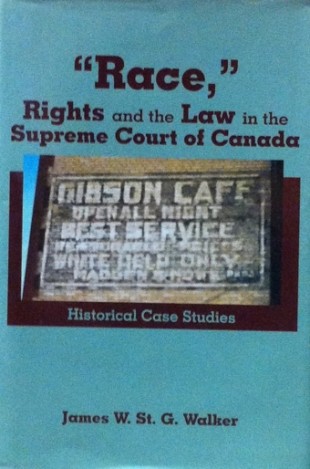by James St. G. Walker, Professor of History and Associate Chair of Graduate Studies at the University of Waterloo. Published with Wilfrid Laurier University Press, 1997.
Professor James Walker is a distinguished historian who has made a substantial contribution to understanding the role of minority groups, especially aboriginal populations and those of African ancestry, in the Canadian past. The present study is a culmination of years of thought and research in this critical area. ‘Race,’ Rights and the Law in The Supreme Court of Canada: Historical Case Studies is a superb analysis of how the Canadian judicial system dealt with four cases where “race” and “law” intersected: Quong Wing v. The King (1914); Christie v. York Corporation (1939); Noble and Wolf v. Alley (1950); and Narine-Singh v. Attorney General of Canada (1955).Professor Walker himself aptly notes that the events described in this book will “challenge many Canadians’ image of our national history and character, and the nature of our justice system.” But these events are on the whole encouraging and even inspirational, revealing how minority Canadians confronted restrictions in the past despite institutional barriers.The book also illustrates the rich possibilities of using case law to illuminate Canadian social history and the value of understanding the context of the times in interpreting court decisions. Not least impressive is how surefootedly Professor Walker, without formal legal training, has tackled and understood legal issues of great complexity and subtlety. ‘Race,’ Rights and the Law achieves new standards of legal-historical analysis in Canada. It will be of great interest to scholars of law and history and to all those concerned with building a Canadian future worthy of those who challenged racial disadvantage in the past.


